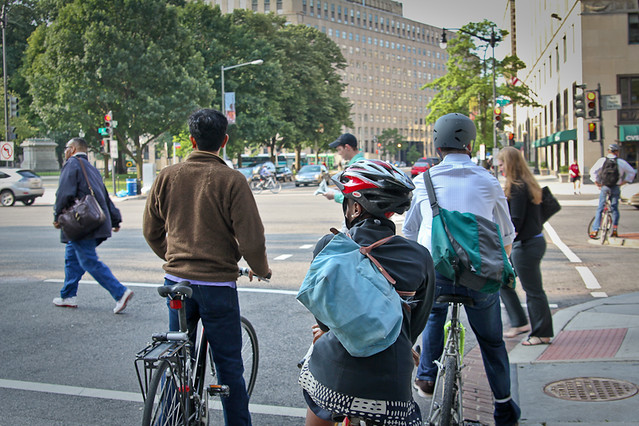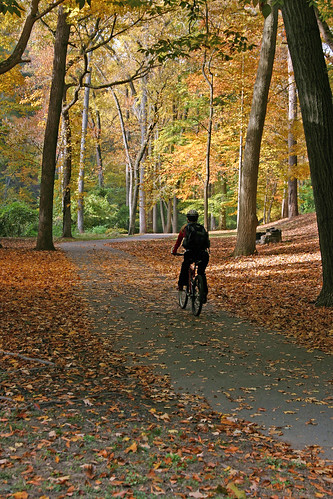Steal Something of Mine?
My bike was stolen. I knew I would see it again.
The Washington Post, June 27, 2002
(c) Joe Flood
I knew that I would one day see my bike again. I just knew it. My old Bianchi Broadway had been stolen off the back stairs of my building. I couldn’t believe that someone had gone to the trouble. The mountain bike was five years old, with worn tires, a temperamental chain, and a skein of rust on its exposed parts. To take it, my thief had to go up two flights of winding metal stairs, break the U-lock, and then carry the bike back down.
Looking out that Sunday morning, at the empty spot along the rail where my bike should be, I was surprised. I shouldn’t have been. Kryptonite named Washington, DC as one of the “Top 10 Worst Cities for Bike Theft.” Nationwide, it is estimated that 1.5 million bicycles are stolen every year. An experienced thief can take your locked bike in about 10-20 seconds.
I just couldn’t believe that someone would steal something of mine. It hadn’t been an expensive bike, but it was the first bike I had ever owned. And my Bianchi had been with me everywhere. I had commuted on it up the long hill to American University. Ridden on it on pleasant weekend excursions along the C&O Canal. Coasted down the Mall by softball players and tourists. Why would someone steal something of mine? According to the National Bike Registry, the most common reason for bike theft is to pay for drugs. The value of a stolen bicycle is roughly 5-10% of the bicycle’s original retail value. Bikes are even used in lieu of currency in drug transactions.
But now my bike was gone. I don’t know why I bothered to report it. The police didn’t even come by to take my report; I filed it by phone. And stolen bikes are rarely recovered.
Yet, I knew I would one day see my bike again. For months afterward, whenever I saw a red mountain bike I would stop and squint at it, looking for identifying characteristics. No, the handlebars are too straight. No, the tires are too narrow. No, the bike looks too new.
One summer later, I found her. I was walking past a dusty park a couple blocks from my apartment, a little worn square of grass where men sit and drink. I looked over. Something that looked like my bike was leaning against a tree. I stepped into the park. The frame was covered with tacky stickers and duct tape. There was a big gash in the seat. It looked like the gearshifts had been broken off and the tires replaced. But it was my bike. I could tell by the rust.
The bike’s owner, a short Salvadoran walked over to me.
“This looks an awfully like my old bike,” I said.
“No, no, no. Es mine,” he said, pointing to his chest.
“I’m not saying you stole it, but this is my old bike,” I insisted.
We bantered in broken English and Spanish.
“I don’t want no trouble,” he said. He led me out of the park. “You follow, you follow,” he said, waving me on.
He got on the bike and rode out of the park, me walking behind him. I was waiting for him to take off and pedal away but he never did. My heart was pounding and I was shaky. Where was he taking me? He was careful not to get too far ahead of me, coasting down the sidewalk, looking back at me.
He turned down an empty alley. I followed. He reached a wooden door in a fence and pushed it open. He waved at me to come in. Me and the new owner of my bike squeezed into a narrow passage between a wall and a garage. The door shut.
He went to go get someone. I waited in a small courtyard. A man, his neighbor, approached. When he got closer, I saw that he had a Spanish-English dictionary in his hands.
I explained that this was my bike.
The neighbor got the story out of the Salvadoran man. He and his friend had found it, among junk, along V Street. They had taken it home and fixed it up. They fixed up bikes they found in the area. The neighbor didn’t know where they got them from but that they weren’t thieves.
The Salvadoran got anxious during the explanation.
“Calm down! Tranquilo!” his interpreter said. “He wants you to know that he’s not a criminal.”
“No criminal, no criminal.” He paced in the little courtyard, looking up into my eyes.
I didn’t think that he was a criminal. He could have told me to get lost back at the park, or rode off when I was following him. He didn’t have to get his neighbor to try to clear up the situation.
He offered me the bike. I didn’t want it. The bike was ruined, and nothing like the bike which had taken me everywhere. I had bought another one a few months earlier. I told him that he could keep it, that I didn’t think that he was a criminal.
“No criminal,” the man said, happy.
“No criminal,” I replied.
“Problem solved,” the neighbor added, relaxing.
The neighbor asked me my name. Joe. His was Joseph. The Salvadoran’s was Jose.
“Hey, we all got the same name,” Joseph said, beaming. “Joe, Joseph, and Jose.”
“Joe, Joseph, and Jose,” Jose said, pointing at each of us in turn.
I squeezed the brakes on my bike one last time and left.


